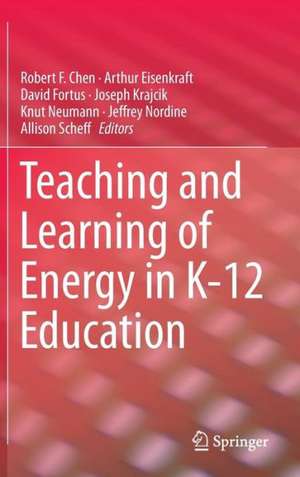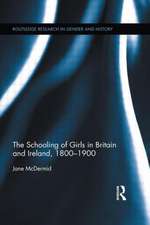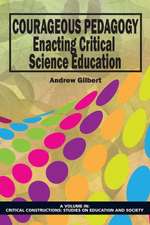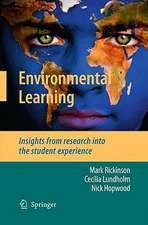Teaching and Learning of Energy in K – 12 Education
Editat de Robert F. Chen, Arthur Eisenkraft, David Fortus, Joseph Krajcik, Knut Neumann, Jeffrey Nordine, Allison Scheffen Limba Engleză Hardback – 6 mai 2014
Energy is one of the most important ideas in all of science and it is useful for predicting and explaining phenomena within every scientific discipline. The challenge for teachers is to respond to recent policies requiring them to teach not only about energy as a disciplinary idea but also about energy as an analytical framework that cuts across disciplines. Teaching energy as a crosscutting concept can equip a new generation of scientistsand engineers to think about the latest cross-disciplinary problems, and it requires a new approach to the idea of energy.
This book examines the latest challenges of K-12 teaching about energy, including how a comprehensive understanding of energy can be developed. The authors present innovative strategies for learning and teaching about energy, revealing overlapping and diverging views from scientists and science educators. The reader will discover investigations into the learning progression of energy, how understanding of energy can be examined, and proposals for future directions for work in this arena.
Science teachers and educators, science education researchers and scientists themselves will all find the discussions and research presented in this book engaging and informative.
| Toate formatele și edițiile | Preț | Express |
|---|---|---|
| Paperback (1) | 645.14 lei 6-8 săpt. | |
| Springer International Publishing – 3 sep 2016 | 645.14 lei 6-8 săpt. | |
| Hardback (1) | 645.79 lei 6-8 săpt. | |
| Springer International Publishing – 6 mai 2014 | 645.79 lei 6-8 săpt. |
Preț: 645.79 lei
Preț vechi: 759.76 lei
-15% Nou
Puncte Express: 969
Preț estimativ în valută:
123.57€ • 129.03$ • 102.04£
123.57€ • 129.03$ • 102.04£
Carte tipărită la comandă
Livrare economică 15-29 aprilie
Preluare comenzi: 021 569.72.76
Specificații
ISBN-13: 9783319050164
ISBN-10: 3319050168
Pagini: 392
Ilustrații: IX, 379 p. 35 illus., 16 illus. in color.
Dimensiuni: 155 x 235 x 27 mm
Greutate: 0.57 kg
Ediția:2014
Editura: Springer International Publishing
Colecția Springer
Locul publicării:Cham, Switzerland
ISBN-10: 3319050168
Pagini: 392
Ilustrații: IX, 379 p. 35 illus., 16 illus. in color.
Dimensiuni: 155 x 235 x 27 mm
Greutate: 0.57 kg
Ediția:2014
Editura: Springer International Publishing
Colecția Springer
Locul publicării:Cham, Switzerland
Public țintă
ResearchCuprins
Introduction.- A Physicist’s Musings on Teaching about Energy.- A Space Physicist’s Perspective on Energy Transformations and Implications for Teaching about Energy at All Levels.- Conservation of Energy: An Analytical Tool for Student Accounts of Carbon-Transforming Processes.- Developing Energy Conception of Students in Chemistry: Research on the Learning and Teaching of Energy.- Teaching and Learning the Physics Energy Concept.- Mapping Energy in the Boston Public Schools Curriculum.- Developing and Using Distractor-Driven Multiple-Choice Assessments Aligned to Ideas about Energy Forms, Transformation, Transfer, and Conservations.- Towards a Research-Informed Teaching Sequence for Energy.- Contextual Dimensions of the Energy Concept and Implications for Energy Teaching and Learning.- A Tale of Two Energies: What Do History, Language, and Research Tell Us about Students’ Understanding of Energy?.- Distinctive Features and Underlying Rationale of a Philosophically-Informed Approach for Energy Teaching.- Repairing Engineering Students’ Misconceptions about Energy and Thermodynamics.- Looking through the Energy Lens: A Proposed Learning Progression for Energy in Grades 3-5.- Opportunities for Reasoning about Energy within Elementary School Engineering Experiences.- The Energy Project: Constructing a Sustainable Foundation for Thinking and Learning about Energy in the 21st Century.- Launching the Space Shuttle by Making Water: The Chemists View of Energy.- Several Often-Neglected Perspectives of Energy in Chemical Education.- Energy in Chemical Systems.- Conclusion and Future Directions.
Recenzii
“This collective work makes a significant contribution to further enrichment of the already massive bibliography concerning the issue of energy teaching and the systematic investigation of the epistemological, learning and teaching dimensions. In the final chapter of the book, the editors recommend future research directions, many of which have already been launched since decades. I would like to wish the readers of the book to have a pleasant reading … .” (Dimitris Koliopoulos, Science and Education, Vol. 25, 2016)
Textul de pe ultima copertă
This volume presents current thoughts, research, and findings that were presented at a summit focusing on energy as a cross-cutting concept in education, involving scientists, science education researchers and science educators from across the world. The chapters cover four key questions: what should students know about energy, what can we learn from research on teaching and learning about energy, what are the challenges we are currently facing in teaching students this knowledge, and what needs be done to meet these challenges in the future?
Energy is one of the most important ideas in all of science and it is useful for predicting and explaining phenomena within every scientific discipline. The challenge for teachers is to respond to recent policies requiring them to teach not only about energy as a disciplinary idea but also about energy as an analytical framework that cuts across disciplines. Teaching energy as a crosscutting concept can equip a new generation of scientistsand engineers to think about the latest cross-disciplinary problems, and it requires a new approach to the idea of energy.
This book examines the latest challenges of K-12 teaching about energy, including how a comprehensive understanding of energy can be developed. The authors present innovative strategies for learning and teaching about energy, revealing overlapping and diverging views from scientists and science educators. The reader will discover investigations into the learning progression of energy, how understanding of energy can be examined, and proposals for future directions for work in this arena.
Science teachers and educators, science education researchers and scientists themselves will all find the discussions and research presented in this book engaging and informative.
Energy is one of the most important ideas in all of science and it is useful for predicting and explaining phenomena within every scientific discipline. The challenge for teachers is to respond to recent policies requiring them to teach not only about energy as a disciplinary idea but also about energy as an analytical framework that cuts across disciplines. Teaching energy as a crosscutting concept can equip a new generation of scientistsand engineers to think about the latest cross-disciplinary problems, and it requires a new approach to the idea of energy.
This book examines the latest challenges of K-12 teaching about energy, including how a comprehensive understanding of energy can be developed. The authors present innovative strategies for learning and teaching about energy, revealing overlapping and diverging views from scientists and science educators. The reader will discover investigations into the learning progression of energy, how understanding of energy can be examined, and proposals for future directions for work in this arena.
Science teachers and educators, science education researchers and scientists themselves will all find the discussions and research presented in this book engaging and informative.
Caracteristici
First volume to discuss teaching energy as a cross-cutting concept across all science disciplines Describes new techniques of how to teach energy as an interdisciplinary topic Includes perspectives of science educators, scientists and science teachers Includes supplementary material: sn.pub/extras















